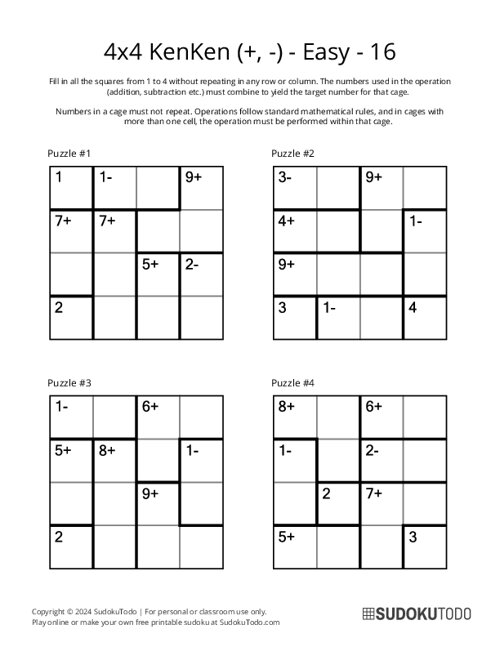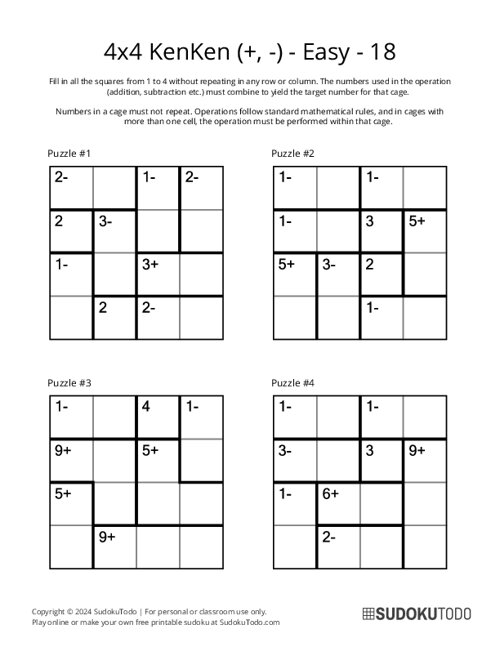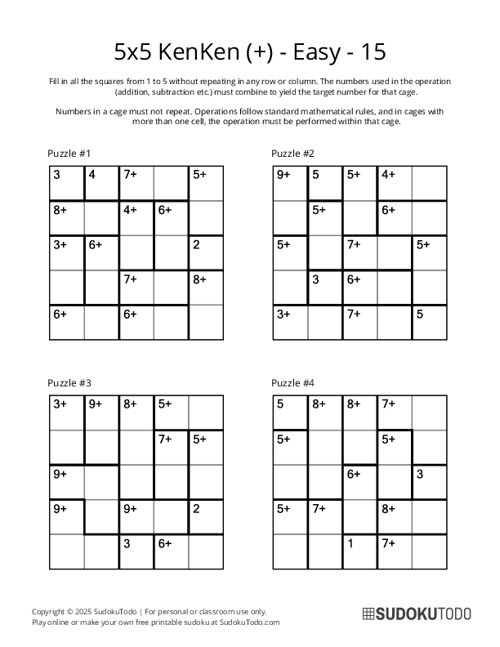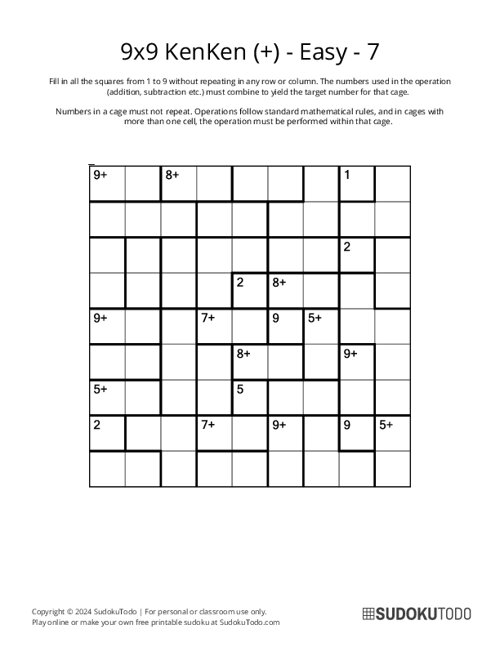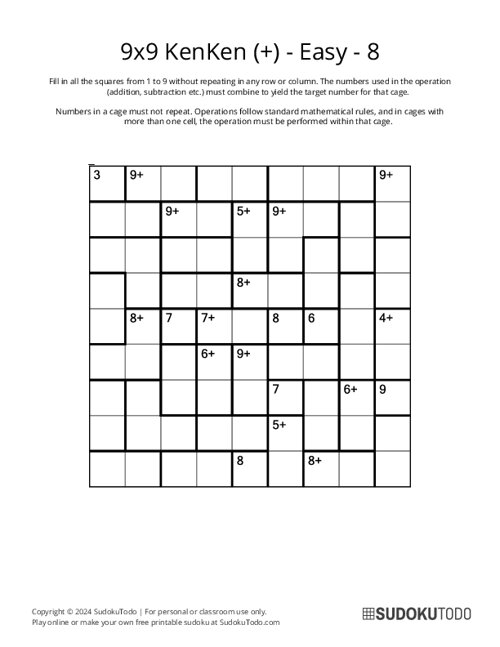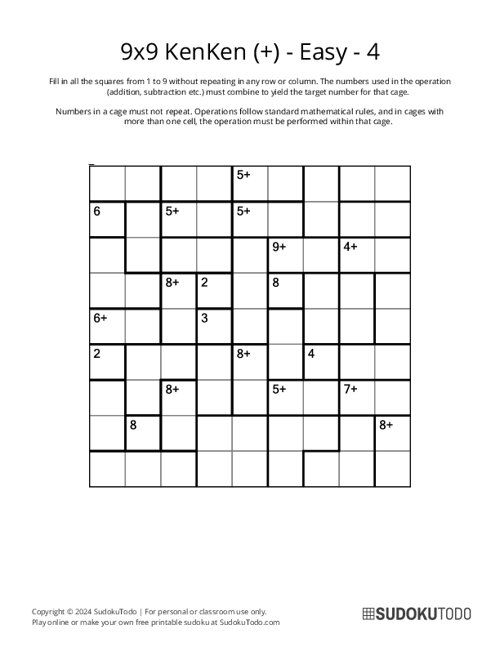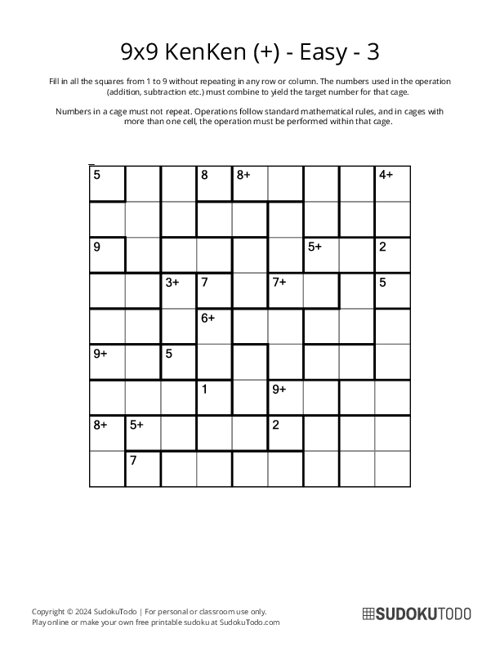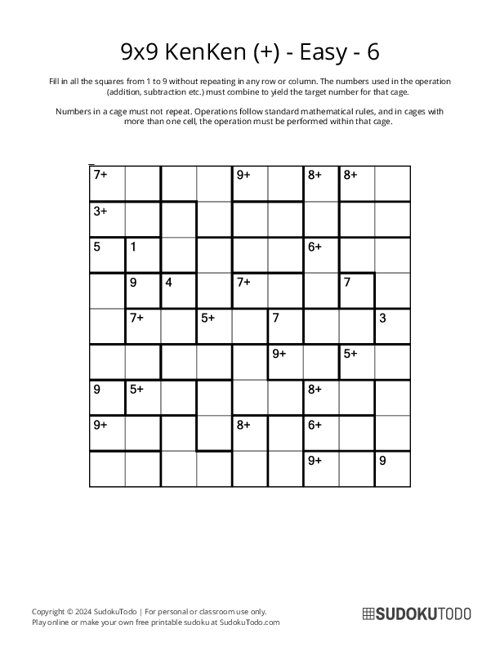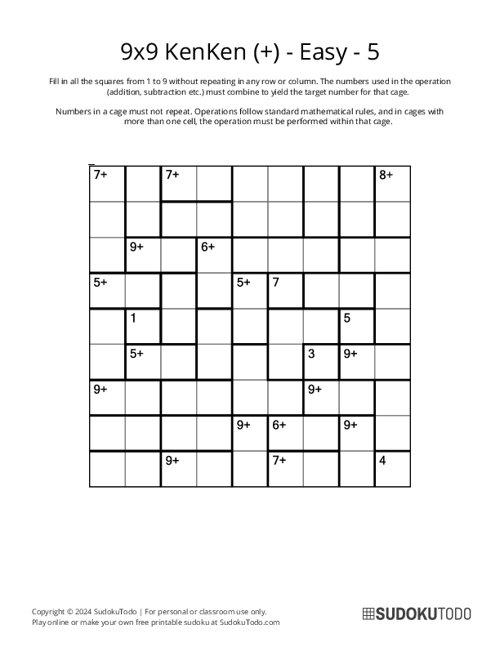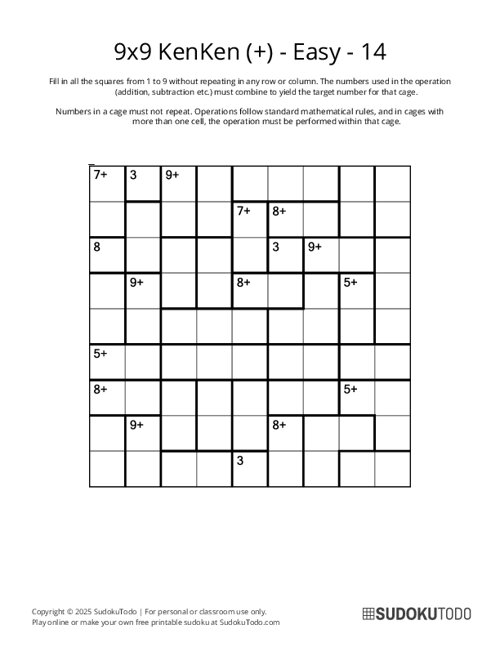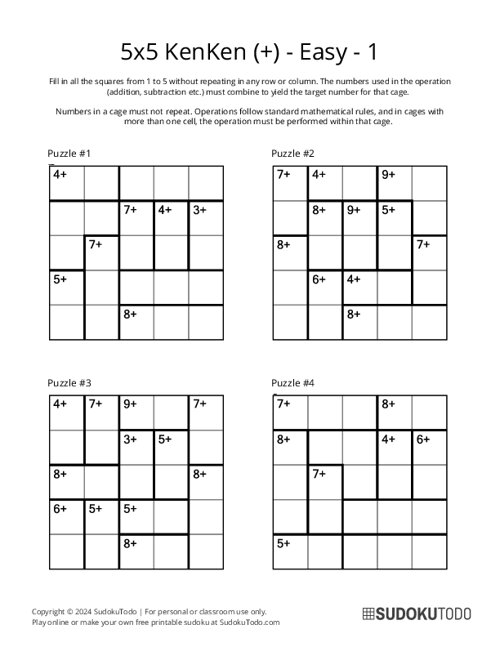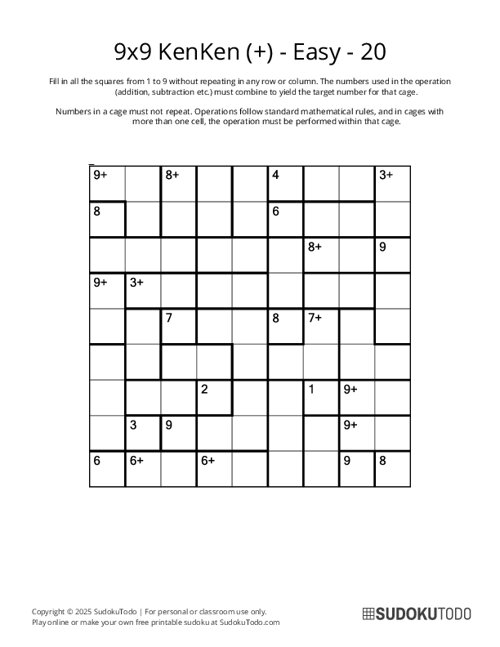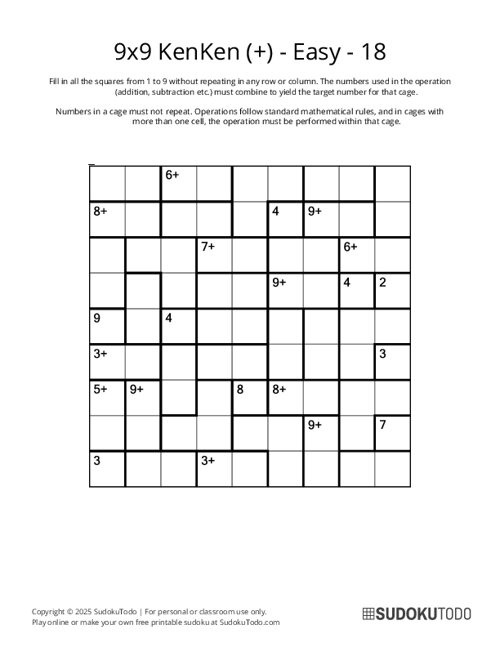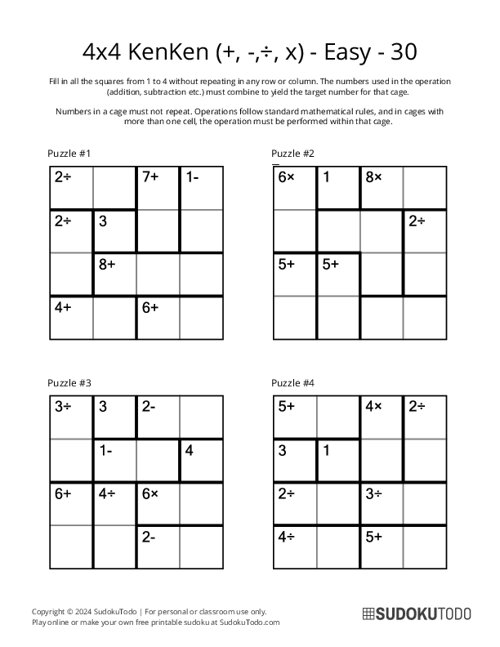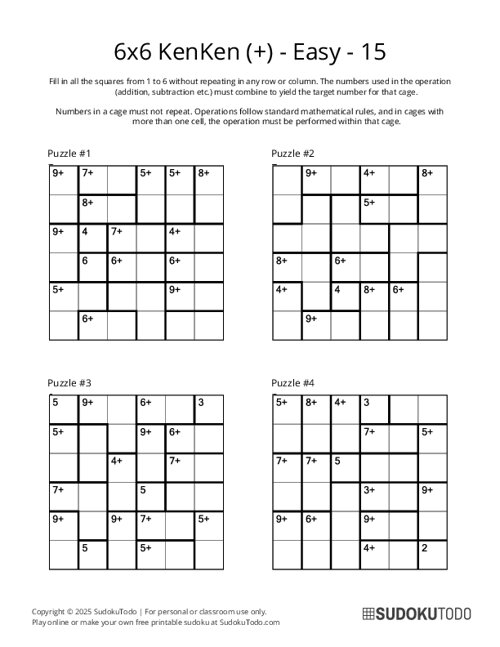Printable Sudoku
- Alphabet
- Battleships
- Binary
- Bridges / Hashi
- Chain Sudoku
- Consecutive
- Cross Sudoku
- Flower Sudoku
- Frame Sudoku
- Futoshiki
- Galaxies
- Greater Than
- Hitori
- Jigsaw Sudoku
- Kakuro
- KenKen
- Killer Sudoku
- Kropki Sudoku
- Little Killer
- Magic Squares
- Nonogram
- Odd Even Sudoku
- Outside Sudoku
- Rossini Sudoku
- Samurai Sudoku
- Sandwich
- Skyscraper
- Slitherlink
- Sohei Sudoku
- Star Battle
- Sudoku
- Sudoku for Kids
- Sudoku Mine
- Sudoku XV
- Sujiken
- Tripledoku
- Tripod Sudoku
- Twodoku
- Vudoku
- Windmill
Special Variations
Generate
Play / Solve
Easy KenKen Puzzles
Download free printable Easy Level KenKen puzzles to sharpen your math and logic skills! Perfect for beginners, these simple KenKen puzzles are fun, educational, and ideal for kids and adults. Download, print and start solving today!
Showing 1-15 of 130 records
Sort by:
4x4 KenKen (+,-) - Easy - 16
4x4 KenKen (+,-) - Easy - 18
5x5 KenKen (+) - Easy - 15
9x9 KenKen (+) - Easy - 7
9x9 KenKen (+) - Easy - 8
9x9 KenKen (+) - Easy - 4
9x9 KenKen (+) - Easy - 3
9x9 KenKen (+) - Easy - 6
9x9 KenKen (+) - Easy - 5
9x9 KenKen (+) - Easy - 14
5x5 KenKen (+) - Easy - 1
9x9 KenKen (+) - Easy - 20
9x9 KenKen (+) - Easy - 18
4x4 KenKen (+,-,÷,x) - Easy - 30
6x6 KenKen (+) - Easy - 15
About KenKen Puzzles
KenKen, also called "KenDoku" or "Mathdoku," is a puzzle game like Sudoku but with math. It was created by a Japanese math teacher, Tetsuya Miyamoto, and became popular because it's both challenging and fun.
The puzzle uses a grid, usually between 3x3 and 9x9 in size. To solve it, you fill in the grid with numbers, following simple math rules to complete the puzzle correctly.
How to Play
- Grid Size: Each row and each column must contain all the numbers from 1 up to the grid size (for a 4x4 grid, numbers 1 to 4; for a 6x6 grid, numbers 1 to 6, etc.).
- No Repeats: No number can repeat within a row or column, similar to Sudoku.
- Cages: The grid is divided into heavily outlined groups of cells, known as "cages". Each cage has a target number and a mathematical operation (+, −, ×, ÷) listed in the corner of one cell in the cage. The numbers in each box must add, subtract, multiply, or divide to match the target number shown. For example, If a box with two squares shows "5+," the two numbers should add up to 5 (like 2 + 3).
- Operation Rules: For addition and multiplication, the order of numbers doesn’t matter (i.e., 2 + 3 is the same as 3 + 2). For subtraction and division, order matters (i.e., in a "2−" cage with two cells, the possible numbers are 3 and 1, where 3 − 1 = 2).
Solving Tips and Techniques:
- Start with Single Cell: These are the easiest cells because the target number is the only option for that cell. Start with these cells to quickly fill in some answers.
- Try Simple Operations First: For cages with two cells and simple operations (addition and multiplication), there are fewer possibilities. For example, A "3+" cage in a 4x4 grid could only be (1, 2), or a "4×" cage in a 4x4 grid could be (1, 4) or (2, 2).
- Constraints: Like Sudoku, each number can only appear once in each row and column. This rule helps you figure out which numbers can’t go in certain spots. For example, if you've already used the number 4 in a row, then no other cell in that row can have a 4.
- Cage Intersections: Cells that belong to more than one cage follow extra rules because they need to match the requirements of both cages. For example, if a cell is part of a '3+' cage, and other cells in its row already have certain numbers, you can use both the cage rules and the row rules to figure out what number can go in that cell.
- Elimination: Once some cells are filled, use logical deduction to narrow down the possibilities in neighboring cells.
KenKen puzzles, with practice, become a fun way to spot patterns and improve your math skills. Starting with smaller grids can make it easier to learn, and as you get better, bigger grids will give you new challenges and more complex puzzles to solve.
